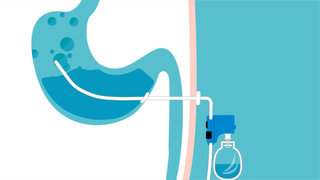This Weight Loss Device to Treat Obesity Looks Insane—But Is It, Really?

Unless you’ve been avoiding cable news and Twitter lately (in which case we're jealous), you’ve probably heard about AspireAssist, the controversial new obesity treatment that was approved by the Food and Drug Administration last week.
Basically, it’s a tube that’s surgically inserted into a person’s stomach, and allows them to drain some of the food they’ve just eaten through a port valve and into a toilet. Approved for folks with a BMI between 35 and 55 (a BMI over 30 is classified as obese), the AspireAssist can prevent the body from absorbing nearly a third of a meal’s calories. (Here’s a video that shows how it works.)
Now, before we go any further, let’s just admit that our knee-jerk reaction was that this device sounds totally bonkers. We weren’t alone, either. The media dubbed it a "bulimia machine." Stephen Colbert explained it as "machine-assisted abdominal vomiting."
RELATED: The Eating Disorder Many Women Don't Know They Have
But is this opinion fair? Probably not.
“It’s not society’s job to judge [the AspireAssist] based on whether they think it’s morally okay or not,” says Yoni Freedhoff, MD, author of The Diet Fix and the director of the Bariatric Medical Institute in Ottawa, Canada. (For the record, he’s unaffiliated with the device.) “Our opinions should be based on evidence and results.”
And, he says, the data behind the AspireAssist is actually pretty good. A year-long trial followed 111 people who used the AspireAssist and compared them to 60 people who didn’t have the device. Both groups received dietary and lifestyle advice along the way. After 52 weeks, those who were using the AspireAssist lost 12.1% of their body weight, while the other group lost only 3.6%.
As for the criticism that the device mimics bulimia, it’s not approved for people with that very serious eating disorder. It’s not approved for anyone with binge eating disorder or nighttime eating disorder either.
There has also been concern that the device will encourage gluttony, or that people who opt for the AspireAssist will eat whatever they want, with a 30% discount on calories. (It almost sounds unfair, right?)
RELATED: The 10 Biggest Weight Loss Mistakes All Women Make
Only, that’s not what happened in the study, says Louis Aronne, MD, director of the Comprehensive Weight Control Center at Weill Cornell Medicine and New York-Presbyterian, and a researcher who was involved in the clinical trials of the device. “People didn’t keep eating,” he says. “They felt full.”
“People assume that [obesity] is under a person’s control,” says Dr. Arrone. “They think, ‘[That person] should stop eating as much.” But in fact, it’s more complicated than willpower alone.
When we eat, our brains produce hormones that eventually tell us we’re full, he says. But as time goes on and we gain weight, that “you’re full” signal may become blunted. He suspects that may explain why the AspireAssist can help people: They get the food they need to stay full, minus about one-third of the calories.
If it still seems like a quick-fix solution, keep in mind that the device needs to be surgically implanted, and you have to spend about 5 to 10 minutes after every meal draining your stomach. “[The AspireAssist] doesn’t sound like the easy way out,” says Dr. Freedhoff. “It sounds incredibly involved.”
Dr. Freedhoff said he was personally shocked by how many people have reached out to him and expressed negative reactions to the device. “I’ve never seen something more raked over the coals,” he says.
RELATED: What to Know About the 'Biggest Loser' Study
It might be because we tend to think people who can’t lose weight are “lazy, slothful, and gluttonous,” he says. Never mind the fact that obesity is a complicated mix of genetics and our environment—or that weight loss is pretty freaking hard for plenty of people.
“We only moralize about obesity, which is always fair-game in our society—from Saturday morning cartoons to late-night comedy shows,” says Dr. Freedhoff.
Regardless of how people feel about this particular device, it’s time for all that to change, he says.
-
Use Slim-N-Trim Natural Appetite Suppressant Pills For Easy Weight Loss
Today, most of us follow eat-and-run culture. Due to this, it becomes
-
Low-Carb Diets - An Introduction
According to a recent survey by the National Health
-
How You Can Improve Performance by Altering Sleep Habits
You may have read many times about what fitness experts call the “h
-
Do Not Be A Chump, Lose Fat Quickly
If you want to lose fat quickly and take the advice of everyone for th
-
How Can I Get Skinny
Weight Loss Methods - Finding The Right One If you are someone that is
-
Diet Plans Day By Day
“The history of diet plan dated from the moment that the first monke
- DON'T MISS
- Weight Loss Drug Information
- Eating Out
- Exercise To Reduce Stomach - Fast And Easy
- An Eating Plan For Weight Loss – End The Struggle
- Your Ultimate Slim-Down Day
- Diet Secrets Exposed, Learn Which Weight Loss Program Works Best!
- An Important Weight Loss Tip
- Kennewick HCG diet-reducing your weight permanently.
- How To Loose Weight
- Lose Weight Tips ?You Don抰 Have To Starve Yourself To Lose Weight! Use These Tips For Losing Weigh




